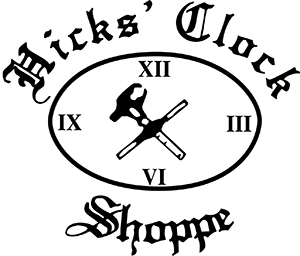About The Chimes
The majority of Floor Clocks available today are equipped with Westminster Chimes. Certain clocks are also supplied with triple chimes so that the turning of a selector switch on the dial face gives the choice of Westminster, Whittington, or St. Michael’s chimes.
The Westminster Chime strikes four notes on the quarter-hour, eight notes on the half-hour, twelve notes on the three-quarter hour, and the hour chimes sixteen notes and strikes the hour
Some clocks are now equipped with a sequential chime movement that plays Westminster, St. Michael, and Whittington chimes sequentially or solely.
Most clocks have a “Big-Ben” hour gong. The majority of floor clocks have a series of chime rods inside the case, which upon being struck by the clock’s “hammers” results in a harmonious chime. Chime rods are about 1/4″ in diameter and vary from 12″ to 17″ in length. A rare minority of floor clocks utilize chime tubes instead of rods. Tubes are 1″ to 1 1’2″ in diameter and 43″ to 62″ in length and create an entirely different tonal quality.
Chime Shut-Off
Most clocks have a means of silencing both the chime section and the hour strike. This is accomplished by a lever on the dial face or by two draw-cords inside the cabinet.
A new feature on some clocks is the night silencer that automatically silences the clock between 10:00 p.m. and 7:00 a.m.
Other Chime Options
Some floor clocks available on the market today are equipped with a self-adjustment mechanism to ensure that the clock strikes and chimes at the proper time. If it is necessary to move the hands either backward or forward, the clock will self-adjust within one hour.
Westminster Chimes
The world’s most famous chimes are the Westminster. Nearly everyone associates the Westminster chimes with the Clock Tower (also known as the ‘Big Ben Tower’) at the House of Parliament in London. Originally however, they were fitted to the clock of the University Church, St Mary’s the Great, in Cambridge, England. The words to this beautiful chime come from one of G. F. Handel’s famous musical compositions, “I Know That My Redeemer Liveth” and could be our daily prayer:
“Lord through this hour,
Be Thou our guide
So, by Thy power
No foot shall slide.“
Whittington Chimes
The famous Whittington chime is derived from the Church of St. Mary’s le Bow, in Cheapside, London. The legend is that Dick Whittington, running away from ill-treatment as a house waif, seemed to hear the chimes say, “Turn again- Whittington, Lord Mayor of London Town.” Dick turned back to eventually serve three terms as London’s Lord Mayor of London Town.
St. Michaels Chimes
The story of the St. Michael chimes is one of adventure and perhaps has more significance to the United States since their history is a part of our heritage. The bells were cast in London and installed in St. Michael’s Church in Charleston, South Carolina in 1764. When the British took over the city during the Revolutionary War the bells were taken by them back to England. A Charleston merchant bought them in England and shipped them home to America.
In 1823, cracks were found in some of the bells and they were returned to London to be recast. In 1862, during the siege of Charleston, the bells were moved to Columbia for safe-keeping but Sherman’s army set fire to that area. Only fragments of the bells were found to be returned to London once more, where the original molds still stood. In February 1867, the bells were again installed in St. Michael Steeple, and on March 21st, joyously rang out, “Home again, Home again from a Foreign Land.”
Winchester Chimes
While not included in our “listening” midis, the Winchester chimes also have a very interesting history. The Norman conquerors of England did not like the fantastic cathedral chimes of the Saxons, so Bishop Walkilin, a kinsman of William the Conqueror, demolished and rebuilt the Winchester chimes in 1093. The cathedral’s central tower, which contained the chimes, fell in 1107 but soon was rebuilt. This edifice forms a substantial part of the present cathedral, located in Hampshire, England. The lyrics of the Winchester chime is:
“O Art Divine, exalted blessing!
Each celestial charm expressing!
Proudest gift the gods bestow
Sweetest chimes that mortals know.”
